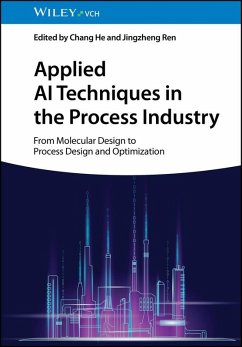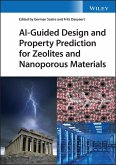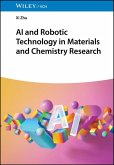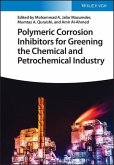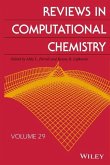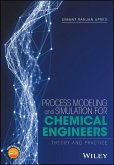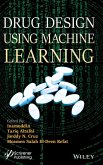Applied AI Techniques in the Process Industry
From Molecular Design to Process Design and Optimization
Herausgegeben:He, Chang; Ren, Jingzheng
Applied AI Techniques in the Process Industry
From Molecular Design to Process Design and Optimization
Herausgegeben:He, Chang; Ren, Jingzheng
- Gebundenes Buch
- Merkliste
- Auf die Merkliste
- Bewerten Bewerten
- Teilen
- Produkt teilen
- Produkterinnerung
- Produkterinnerung
Data-driven and first principles models for energy-relevant systems and processes approached through various in-depth case studies.
Andere Kunden interessierten sich auch für
![Computational Drug Discovery, 2 Volumes Computational Drug Discovery, 2 Volumes]() Computational Drug Discovery, 2 Volumes216,99 €
Computational Drug Discovery, 2 Volumes216,99 €![Ai-Guided Design and Property Prediction for Zeolites and Nanoporous Materials Ai-Guided Design and Property Prediction for Zeolites and Nanoporous Materials]() Ai-Guided Design and Property Prediction for Zeolites and Nanoporous Materials193,99 €
Ai-Guided Design and Property Prediction for Zeolites and Nanoporous Materials193,99 €![AI and Robotic Technology in Materials and Chemistry Research AI and Robotic Technology in Materials and Chemistry Research]() Xi ZhuAI and Robotic Technology in Materials and Chemistry Research90,99 €
Xi ZhuAI and Robotic Technology in Materials and Chemistry Research90,99 €![Polymeric Corrosion Inhibitors for Greening the Chemical and Petrochemical Industry Polymeric Corrosion Inhibitors for Greening the Chemical and Petrochemical Industry]() Polymeric Corrosion Inhibitors for Greening the Chemical and Petrochemical Industry159,00 €
Polymeric Corrosion Inhibitors for Greening the Chemical and Petrochemical Industry159,00 €![Reviews in Computational Chemistry, Volume 29 Reviews in Computational Chemistry, Volume 29]() Reviews in Computational Chemistry, Volume 29200,99 €
Reviews in Computational Chemistry, Volume 29200,99 €![Process Modeling and Simulation for Chemical Engineers Process Modeling and Simulation for Chemical Engineers]() Simant R. UpretiProcess Modeling and Simulation for Chemical Engineers119,99 €
Simant R. UpretiProcess Modeling and Simulation for Chemical Engineers119,99 €![Drug Design Using Machine Learning Drug Design Using Machine Learning]() Drug Design Using Machine Learning215,99 €
Drug Design Using Machine Learning215,99 €-
-
-
Data-driven and first principles models for energy-relevant systems and processes approached through various in-depth case studies.
Produktdetails
- Produktdetails
- Verlag: Wiley-VCH
- Artikelnr. des Verlages: 1135339 000
- 1. Auflage
- Seitenzahl: 336
- Erscheinungstermin: 15. Januar 2025
- Englisch
- Abmessung: 250mm x 179mm x 22mm
- Gewicht: 785g
- ISBN-13: 9783527353392
- ISBN-10: 3527353399
- Artikelnr.: 70928791
- Herstellerkennzeichnung
- Wiley-VCH GmbH
- Boschstraße 12
- 69469 Weinheim
- wiley.buha@zeitfracht.de
- Verlag: Wiley-VCH
- Artikelnr. des Verlages: 1135339 000
- 1. Auflage
- Seitenzahl: 336
- Erscheinungstermin: 15. Januar 2025
- Englisch
- Abmessung: 250mm x 179mm x 22mm
- Gewicht: 785g
- ISBN-13: 9783527353392
- ISBN-10: 3527353399
- Artikelnr.: 70928791
- Herstellerkennzeichnung
- Wiley-VCH GmbH
- Boschstraße 12
- 69469 Weinheim
- wiley.buha@zeitfracht.de
Chang He is an associate professor in School of Chemical Engineering and Technology, Sun Yat-Sen University. The research direction is Process System Engineering and is committed to the applied basic research in interdisciplinary fields such as chemical industry, energy, applied mathematics, etc. In recent years, by using machine learning, numerical simulation, and process modeling, he focuses on the multi-scale integration, design, optimization, and sustainability of the advanced energy systems, as well as the energy conservation and emission reduction of key process equipment in the energy-chemical industry under uncertain conditions. Dr. Jingzheng Ren is currently an Associate Professor at The Hong Kong Polytechnic University. He has been selected as the only winner of the 2022 Asia-Pacific Economic Cooperation (APEC) Sience Prize for Innovation, Research and Education (ASPIRE Prize), in recognition of his scientific contribution commitment to excellence in "Innovation to achieve economic, environmental, and social goals" and Bio-Circular-Green Economy.
Chapter 1: Integrating Data-Driven Modeling with First-Principles Knowledge
Chapter 2: Advanced algorithms for Hybrid Data-driven Modelling
Chapter 3: A computational Framework for Model-based Design and Optimization of Dynamic and Cyclic Membrane Processes
Chapter 4: AI-Aided Optimization and Design of MOF Materials for Gas Separation
Chapter 5: Machine Learning Aided Materials and Process Integration Design for High-Efficiency Gas Separation
Chapter 6: Data-driven Screening of High-performance Ionic Liquids
Chapter 7: Hunting for Aromatic Chemicals with AI Techniques
Chapter 8: AI-assisted Drug Design and Production
Chapter 9: Designing a Heat Exchanger by Combining Physics-Informed Deep Learning and Transfer Learning
Chapter 10: Catalyst Design Based on Machine Learning
Chapter 11: Surrogate Models for Sustainability Optimization of Complex Industrial System
Chapter 12: Advanced Machine Learning and Deep Learning Models for Chemical Process Control and Process Data Analytics
Chapter 2: Advanced algorithms for Hybrid Data-driven Modelling
Chapter 3: A computational Framework for Model-based Design and Optimization of Dynamic and Cyclic Membrane Processes
Chapter 4: AI-Aided Optimization and Design of MOF Materials for Gas Separation
Chapter 5: Machine Learning Aided Materials and Process Integration Design for High-Efficiency Gas Separation
Chapter 6: Data-driven Screening of High-performance Ionic Liquids
Chapter 7: Hunting for Aromatic Chemicals with AI Techniques
Chapter 8: AI-assisted Drug Design and Production
Chapter 9: Designing a Heat Exchanger by Combining Physics-Informed Deep Learning and Transfer Learning
Chapter 10: Catalyst Design Based on Machine Learning
Chapter 11: Surrogate Models for Sustainability Optimization of Complex Industrial System
Chapter 12: Advanced Machine Learning and Deep Learning Models for Chemical Process Control and Process Data Analytics
Chapter 1: Integrating Data-Driven Modeling with First-Principles Knowledge
Chapter 2: Advanced algorithms for Hybrid Data-driven Modelling
Chapter 3: A computational Framework for Model-based Design and Optimization of Dynamic and Cyclic Membrane Processes
Chapter 4: AI-Aided Optimization and Design of MOF Materials for Gas Separation
Chapter 5: Machine Learning Aided Materials and Process Integration Design for High-Efficiency Gas Separation
Chapter 6: Data-driven Screening of High-performance Ionic Liquids
Chapter 7: Hunting for Aromatic Chemicals with AI Techniques
Chapter 8: AI-assisted Drug Design and Production
Chapter 9: Designing a Heat Exchanger by Combining Physics-Informed Deep Learning and Transfer Learning
Chapter 10: Catalyst Design Based on Machine Learning
Chapter 11: Surrogate Models for Sustainability Optimization of Complex Industrial System
Chapter 12: Advanced Machine Learning and Deep Learning Models for Chemical Process Control and Process Data Analytics
Chapter 2: Advanced algorithms for Hybrid Data-driven Modelling
Chapter 3: A computational Framework for Model-based Design and Optimization of Dynamic and Cyclic Membrane Processes
Chapter 4: AI-Aided Optimization and Design of MOF Materials for Gas Separation
Chapter 5: Machine Learning Aided Materials and Process Integration Design for High-Efficiency Gas Separation
Chapter 6: Data-driven Screening of High-performance Ionic Liquids
Chapter 7: Hunting for Aromatic Chemicals with AI Techniques
Chapter 8: AI-assisted Drug Design and Production
Chapter 9: Designing a Heat Exchanger by Combining Physics-Informed Deep Learning and Transfer Learning
Chapter 10: Catalyst Design Based on Machine Learning
Chapter 11: Surrogate Models for Sustainability Optimization of Complex Industrial System
Chapter 12: Advanced Machine Learning and Deep Learning Models for Chemical Process Control and Process Data Analytics

